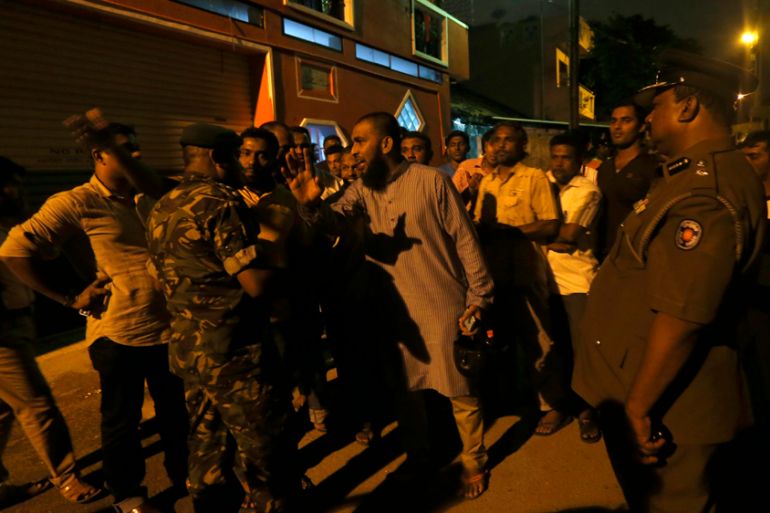Sri Lanka: Muslims remember Buddhist hardliner attacks
Rifts remain after deadly anti-Muslim riots in 2014 killed four and caused tens of thousands of dollars in damage.

Dharga Town, Sri Lanka – For those who live in Muslim-majority Dharga Town on the southwest coast, life will never be the same again.
While peace and tranquility now blanket this quiet town as residents observe the holy month of Ramadan, the scene was sharply different two years ago when Buddhist mobs launched a violent rampage against Muslims and their property.
Keep reading
list of 4 itemsPhotos: Ukraine marks its third Easter at war
Israeli police detain Greek consul’s guard at Orthodox Easter ceremony
Gunman kills at least six in attack on mosque in Afghanistan’s Herat
“I can never be normal again. I live in perpetual fear,” said Nasir Zarook, 28, a shop owner from a wealthy neighbourhood.
His home and 10 vehicles he owned were destroyed when Buddhist attackers lobbed grenades. He escaped death but suffered head injuries after being attacked with clubs. “Life will never be the same,” said Nasir.
His home was among 90 houses destroyed in communal violence on June 15, 2014, when ethnic Sinhalese mobs led by the hardline Bodu Bala Sena – or “Buddhist Power Force”, a nationalist group – went on a rampage in three Muslim-dominated towns in the coastal district of Kalutara.
|
|
| Sri Lanka mudslides bury 150 people: Red Cross |
The two-day assault on Dharga Town, Aluthgama and Beruwala came after an anti-Muslim protest organised by Bodu Bala Sena’s leader, Ven Galagodaaththe Gnanasa Thera, who made an inflammatory speech urging Sinhalese to sever all ties with Muslims – and to “behave like the true majority”.
The demonstration was reportedly called in response to a Buddhist priest being verbally threatened by a Muslim. Bodu Bala Sena has said it was not responsible for the violence.
Anti-Muslim riots
The 2014 communal riots – curiously coinciding with the 100th anniversary of Buddhist-Muslim bloodshed – left three Muslims and one Tamil dead. More than 10,000 people were displaced, some 8,000 Muslims and 2,000 Sinhalese, while another 80 were wounded.
“I fear being targeted again. I will feel safe only when I leave Dharga Town,” said Nasir. “Neighbours turned into attackers,” he noted, even though many perpetrators were not from the area and still roam free. “Where is justice?”
For AH Mohammed, 64, a retired director of education from the national Ministry of Education, the vandalism cost him more than $55,600. His 32-year-old son suffered severe emotional trauma following the attacks, fell ill, and died two years later.
“It’s as if suffering our lost home wasn’t enough. We also had to lose him,” said Mohammed.
Built homes, lost hope
Most homes destroyed in 2014 have been rebuilt and families have returned. But for many their livelihoods were wiped out with about 40 businesses demolished.
“Our businesses have not been compensated, only the homes have been rebuilt. How do we move forward?” said Nasir, whose own losses amounted to $21,000.
For Thowffiq Samsudeen, a shop owner from Beruwala, it was as if the mobs went after “people with some means”.
“We were all brothers just the previous day. For years, we have been feasting together and living peacefully,” he said.

Gamini Viyangoda is from the civil society organisation Puravesi Balaya, or “Citizens’ Force”.
The group led a campaign against the then-government of Mahinda Rajapaksa, a Sinhalese nationalist hardliner whose administration was accused of turning a blind eye to the violence.
“There was growing radicalisation, fanned by the then-government’s policy of Sinhala majoritarianism. The violence was a byproduct of an unspoken policy. The core of the 2014 violence was located within the government itself,” said Viyangoda.
Ven Watareka Wjitha thera is a campaigner for interfaith dialogue who is seeking to create a lasting peace between the communities.
“Institutional structures have been created, but whether this reaches ground level is a problem,” he said.
“We need to reinforce the idea of coexistence in a multi-religious and multicultural Sri Lanka, where our affection and love for each other can prevail over attempts to divide us. That’s our lesson from two years ago.”
|
|
| 101 East – Sri Lanka: Widows of War |